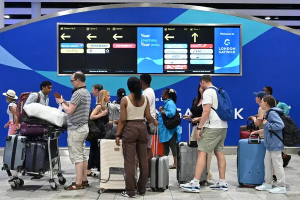Airlines Rush to Get Back on Track After Global Tech Disruption
In an unprecedented turn of events, airlines worldwide are racing to restore normalcy following a massive global technology outage that wreaked havoc on air travel. This disruption, which began on Friday, led to the cancellation of thousands of flights, stranded passengers, and left many airlines grappling with logistical nightmares. As the summer travel season kicks off, the timing couldn’t be worse for travelers eager to embark on their vacations.
The source of the chaos was a faulty software update from CrowdStrike, a cybersecurity firm that services numerous companies globally. The update, which affected computers running Microsoft Windows, was not a result of a cyberattack but rather an operational error. This misstep has raised significant concerns about the reliability of critical technology systems that underpin the aviation industry.
As of Saturday, many airlines were beginning to resume operations, although challenges remained. For instance, Delta Air Lines and its regional affiliates had to cancel over a quarter of their scheduled flights on the East Coast. Reports indicate that more than 1,100 flights were grounded, causing widespread frustration among travelers who had planned their journeys around the busy summer holiday period.
In the UK, the situation was similarly dire. Major airports like Gatwick and Manchester struggled to manage the fallout from the outage. Passengers faced long lines as airport staff resorted to manual check-ins, resulting in delays and last-minute cancellations. The Port of Dover also saw a surge in displaced air travelers seeking alternatives, leading to lengthy waits as they attempted to board ferries to France.
Despite these challenges, some airlines reported progress in returning to normal operations. Eurowings, a budget subsidiary of Lufthansa, announced that it expected to resume largely scheduled flights on Saturday after canceling about 20% of its services the previous day. The airline reassured passengers that online check-in and boarding processes were operational again, although isolated disruptions could still occur.
Meanwhile, the National Cyber Security Center in the UK issued warnings about potential phishing scams targeting individuals and businesses affected by the outage. With cybercriminals eager to exploit the chaos, officials urged vigilance among travelers and organizations alike. Ciaran Martin, the former head of the National Cyber Security Center, noted that while the worst of the crisis seemed to have passed, the recovery for the aviation sector would take longer due to the complexities involved in repositioning stranded crews and aircraft.
In Germany, the impact of the outage was felt across various sectors, with the government’s IT security agency reporting that numerous businesses were still struggling to recover. Many processes were disrupted, but the agency indicated that most affected areas were gradually returning to normal. Airports like Berlin’s were beginning to operate close to schedule, although the backlog from Friday’s cancellations continued to pose challenges.
As airlines work to recover, the focus is not only on restoring flight schedules but also on ensuring the reliability of their technological systems. The incident has sparked discussions about the need for robust contingency plans and backup systems to mitigate the impact of similar disruptions in the future. In Austria, for example, a leading doctors’ organization highlighted the importance of having analogue backups in hospitals to safeguard patient care during such crises.
In the United States, the situation was no different. Delta and United Airlines faced significant cancellations, with Delta reporting over 1,100 flights grounded and United canceling more than 500. Other airlines, such as Southwest and Alaska, managed to avoid major disruptions as they did not utilize the affected CrowdStrike software, resulting in fewer than half a dozen cancellations each.
As the industry works to recover from this setback, the focus remains on ensuring that passengers can resume their travel plans with minimal further disruption. Many travelers have expressed their frustrations on social media, sharing stories of missed connections and extended waits at airports. The airlines, aware of the mounting dissatisfaction, are making concerted efforts to communicate updates and provide support to affected passengers.
In conclusion, the global tech disruption has underscored the vulnerabilities inherent in modern air travel. As airlines and transport providers scramble to restore normal operations, the incident serves as a stark reminder of the critical importance of reliable technology in ensuring smooth travel experiences. With summer vacations in full swing, the hope is that airlines will swiftly overcome these challenges and passengers can once again take to the skies with confidence.


